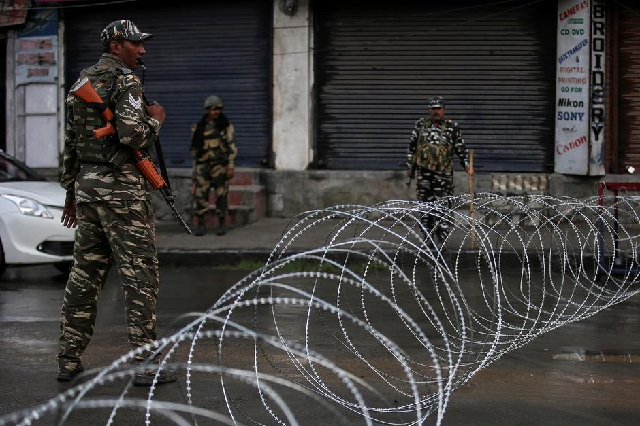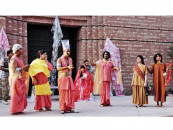'Need security pact to avoid Kashmir-like situation’
At the conference, speakers call for alternate security alliance, to raise issues of concern more forcefully

PHOTO: Reuters
On Aug 5, India dissolved the state of Jammu and Kashmir and also stripped its autonomous character, it held for the past 70-years. Speakers said the security alliance would help them to raise their issues of concern, more forcefully at the world forums.
They also rejected the idea of maintaining the status quo on the issue of Jammu and Kashmir and called for a meaningful dialogue between India and Pakistan for the resolution of the dispute, which is eating vitals of South Asia.
Organised jointly by Pakistan’s Lahore Center for Peace Research and Turkey’s Institute of Strategic Thinking, participants demanded an end to the communication blockade and permission to international human rights organisations and observers to visit Kashmir.
AJK president urges Turkey to play role in opening humanitarian corridor in IOK
Shamshad Ahmad Khan, former foreign secretary of Pakistan, said Kashmir was not a territorial dispute, but involved future of millions of people inhabiting the region. He rejected the idea put out by a Sri Lankan speaker, to make Line of Control (LoC) a permanent border between India and Pakistan.
“Status quo cannot be a solution; we have to go beyond the status quo,” he said.
Many speakers said the UN and Nato have failed to provide peace and security in the world. Both Khan and a retired Turkish military officer Ihsan Basbozkurt called for evolving alternate security architecture.
Retired Brigadier Basbozkurt suggested that to avoid Kashmir like situations, Turkey, Malaysia, Iran and Pakistan, should join hands to ensure peace and security in their regions.
“UN was supposed to maintain peace and security but, as our leader President Recep Tayyip Erdogan says, the security of the world depends on the lips of P-5 leaders,” he said.
NATO not helping to solve security issues
Arguing for alternate security set up, he added that when it comes to Kashmir and Palestine, the UN and Nato just do not care. “That is how we will achieve a greater say in Kashmir,” he emphasised.
Turkish security expert Sezer Akarcali said besides security alliance, there is a need to build a communication strategy as well. He said Nato has failed to provide security to Palestine and Kashmir.
Kashmir dispute continues to put future of one-fifth of humanity at risk: FM
“A narrative is being fed to people that only Nato can solve security issues. If this is the case then why do we have issues of Kashmir and Jerusalem?” he asked
Akarcali, who is a professor by profession, repeatedly emphasized that Kashmir is not a Muslim issue. He said the issue should be projected as a concern for humanity and international society.
Retired Maj. Gen Guay Alpar, also complained about the failure of the NATO. He said even the German Chancellor Angelina Markel was talking about building a European Army. French President Emmanuel Macron has also called Nato a “brain dead” organisation.
Retired admiral from Sri Lanka Jayamath Colombage, had earlier create a furor, by suggesting converting the LoC into a permanent border between India and Pakistan and recognising the status quo on Kashmir.
Pakistan envoy to Turkey, Ambassador Muhammad Syrus Sajjad Qazi, said his country was ready for a meaningful conversation with India on Kashmir.
“There are 11 UN resolutions on Kashmir. But India believes there is no problem of Kashmir. How do you start the process of conversation, when one partner says, there is no issue at all?” he asked.



















COMMENTS
Comments are moderated and generally will be posted if they are on-topic and not abusive.
For more information, please see our Comments FAQ